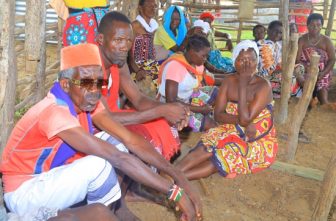Pro-life legislators, advocates say time is ripe to push regulation
Recently released videos alleging Planned Parenthood harvests and sells fetal tissue from aborted fetuses for profit in other states could help push a long sought-after licensing and inspection bill over the final hurdle in Minnesota.
Momentum behind the legislation might rise not because there is evidence that the same practice is happening in this state, where it would be illegal, but because no such evidence can be gathered — abortion clinics in Minnesota are unregulated and unmonitored by the state, as pro-choice politicians have historically protected Planned Parenthood and other providers from any sort of government oversight.
“We need a better understanding of what goes on in those walls,” said State Sen. Michelle Benson (R), a Catholic from Ham Lake and an author of the Senate version of the bill. “Right now it’s like a black-box.”
Attempts to pass a licensing bill have failed in the past, but the seven videos released by the Center for Medical Progress — which include a Planned Parenthood official discussing the “demand” for particular fetal organs over lunch and a former tissue procurement technician describing working with a Planned Parenthood clinician to harvest an aborted boy’s brain while his heart was beating — have created a new sense of urgency for those demanding government oversight.
“These videos have rekindled a strong desire in all of us to make sure this isn’t happening in Minnesota,” said Rep. Kathy Lohmer, a Republican from Stillwater who serves on her chamber’s Health and Human Services Finance and Reform committees.
Lohmer noted that a similar lack of regulation in Pennsylvania resulted in the longtime non-detection of the horrific practices of abortion provider Kermit Gosnell, convicted in 2013 of murdering three infants born alive and killing a patient during a botched abortion.
“We don’t know if that’s not happening here, because we’re not licensing and we’re not inspecting,” she said.
Planned Parenthood officials have said that the edited videos distort their subjects’ words and prove no illegal activity.
Immediate push
On July 20, six days after the release of the first CMP video, 65 pro-life Republicans signed and sent a letter to Gov. Mark Dayton, urging him to provide the people of Minnesota with “a thorough and transparent account of Planned Parenthood’s operations.”
The governor rejected the call for an investigation, stating that GOP politicians were “grandstanding” and that local Planned Parenthood officials had assured him that fetal tissue harvesting wasn’t happening in Minnesota.
But the issue is expected to be taken up in the next legislative session, which begins March 8, 2016. State legislators interviewed by The Catholic Spirit say that in the wake of the CMP videos, they’ve received an influx of calls and emails from constituents demanding changes to the state’s abortion laws.
“I’ve heard from the usual pro-life activists, but I’ve also been hearing a lot from people who don’t normally speak out on this issue,” said Rep. Ron Kresha (R), a Catholic member of the Legislature from Little Falls. “These newcomers are very energized and fired-up.”
Clearly, the videos have struck a nerve.
“To treat a human being at the earliest stages of development as nothing more than raw material for research is very disturbing to people,” said Bill Poehler, the communications director of Minnesota Citizens Concerned for Life. “People don’t like to think of the bodies of babies being dissembled.”
Minnesota abortion laws
Abortion holds a privileged place in Minnesota law. In the 1995 case Doe v. Gomez, the Minnesota Supreme Court ruled that abortion was a constitutional right, requiring the state to pay for abortions requested by women who cannot afford them.
This means that even if Roe v. Wade were overturned at the federal level, state-funded abortions would still be required to be available in Minnesota, as they currently are. According to a report of 2014 state abortion statistics, 3,858 of the 10,123 abortions performed in-state were funded at least in part by tax dollars.
This is a reality that the MCCL says makes the state’s abortion laws the “most extreme in the nation.”
But in some ways, Minnesota’s abortion laws are more restrictive than other states. Clinics are not allowed to distribute the remains of abortion victims for general research if the fetus has “cartilaginous structures, fetal or skeletal parts,” which experts say typically develop by six-eight weeks of pregnancy.
This law was passed in 1987 after several aborted babies were found in a dumpster behind an abortion clinic in Robbinsdale. It requires “the dignified and sanitary disposition of the remains of aborted or miscarried human fetuses,” with exceptions to immediate burial or cremation only allowed for medical testing in specific circumstances.
Oversight needed
According to the 2014 study, the remains of 4,417 aborted fetuses were cremated in the past year in Minnesota, while 35 were buried. The disposal method of more than 5,000 fetuses was not reported, allegedly because they had not reached the stage of development when burial or cremation is required.
However, Jason Adkins, the Minnesota Catholic Conference executive director, said there’s no way of independently verifying that abortion clinics are following the law as long as the government has no regulatory power over them.
“If we have these laws [mandating the dignified disposal of fetal remains] we should have a mechanism to make sure they’re followed,” he said.
“We don’t say that because a company says it’s not polluting we don’t investigate them,” he added, critiquing by comparison Dayton’s willingness to take Planned Parenthood at its word.
The exemptions Planned Parenthood and other abortion providers have from government regulations are the product of a relationship with progressive politicians. Democrats for Life identifies only eight incumbent Minnesota DFL legislators as pro-life. None The Catholic Spirit contacted for this story were available for an interview.
Planned Parenthood of Minnesota, North Dakota and South Dakota contributed more than $220,000 to the campaigns of Dayton and other DFL politicians last year.
This relationship makes it difficult for legislation restricting abortion to take effect in Minnesota, pro-life advocates said. In 2012, Dayton assured pro-choice activists that as governor he would not allow laws to be enacted that limit abortion rights. Later that year, he vetoed an abortion facility licensure bill that passed both the House and the Senate by nearly 2 to 1 margins; it was one of at least four bills restricting abortion that he has vetoed in his tenure.
“He claimed that we were trying to single out abortion clinics for special treatment, but really it was just the opposite,” said the MCCL’s Poehler regarding Dayton’s veto of the licensure bill. “We were trying to close a loophole.”
Supporters of more oversight for abortion facilities often like to say that tattoo parlors in the state of Minnesota are subject to more government scrutiny than are clinics where abortions are provided.
But Benson makes the point a different way. She notes that birthing centers — facilities that allow for the comfort of a home birth but with medical resources on hand — are subject to inspection and licensure requirements that abortion clinics are not, a discrepancy she finds nonsensical.
“Abortion is an invasive process that can also have complications,” she said. “It seems reasonable that if we license places where childbirth is occurring, we should also have licensing for a place where something as unnatural as abortion is occurring.”
Kresha said that abortion providers’ lack of transparency raises suspicions.
“If [abortion providers] have nothing to hide,” he asked, “why aren’t they opening the doors and showing us what they’re doing?”
A tough fight
Benson has already introduced the new version of the licensure and inspection bill that she co-authored, and there’s a companion version in the House; both are before their respective Health and Human Services committees.
Despite bipartisan support for licensure requirement bills in the past and the added momentum from the CMP videos, most of the legislators and policy experts interviewed for this story acknowledged that passing the bill into law would be a tough fight. It will be a challenge to get both HHS committees to approve similar bills.
And, while passage through both chambers of the legislature is possible, there is the familiar threat of a veto waiting at the governor’s desk.
Some legislators pointed out that the challenge is less with Dayton and more with his lieutenant governor, Tina Smith. Smith is a former vice president of Planned Parenthood of Minnesota, North Dakota and South Dakota and an ardent supporter of unrestricted abortion. Some legislators say she has demonstrated unprecedented clout and involvement for a lieutenant governor, and is being groomed as the DFL’s likely nominee for replacing Dayton when term limits prevent him for running for reelection in 2018.
An uncertain future means now might be the best opportunity the pro-life community has to pass laws regulating abortion. If they’re going to do so, legislators and policy experts agree the focus needs to be on an incremental approach.
“If it’s presented well, and not just situated as an attack on Planned Parenthood, the licensing bill actually has a chance of passing,” Adkins said. He urges pro-lifers to maintain civil discourse and not “get sucked into the political battle,” which is too often fueled by emotions.
But pro-life politicians can’t do all the heavy lifting. Constituents need to care about this issue and convey the importance they place on this issue to their elected officials.
“I am pro-life, but I know that our public policy can’t move faster than our public conversation,” said Benson, who sees the CMP videos as valuable tools in helping move the issue forward.
Kresha sees an important role for religious leaders to play.
“We need stronger messages from our pastors, and we need to really have people standing up and making this a priority,” he said.
Although the CMP videos have opened a unique window of opportunity, Lohmer said it will close quickly if it doesn’t translate into political action among constituents.
“Unless the people at large are outraged and make their voices known in a big way, I don’t know what realistically can be done,” she said. “My hope is that people don’t forget about this issue and want to do something about it.”




